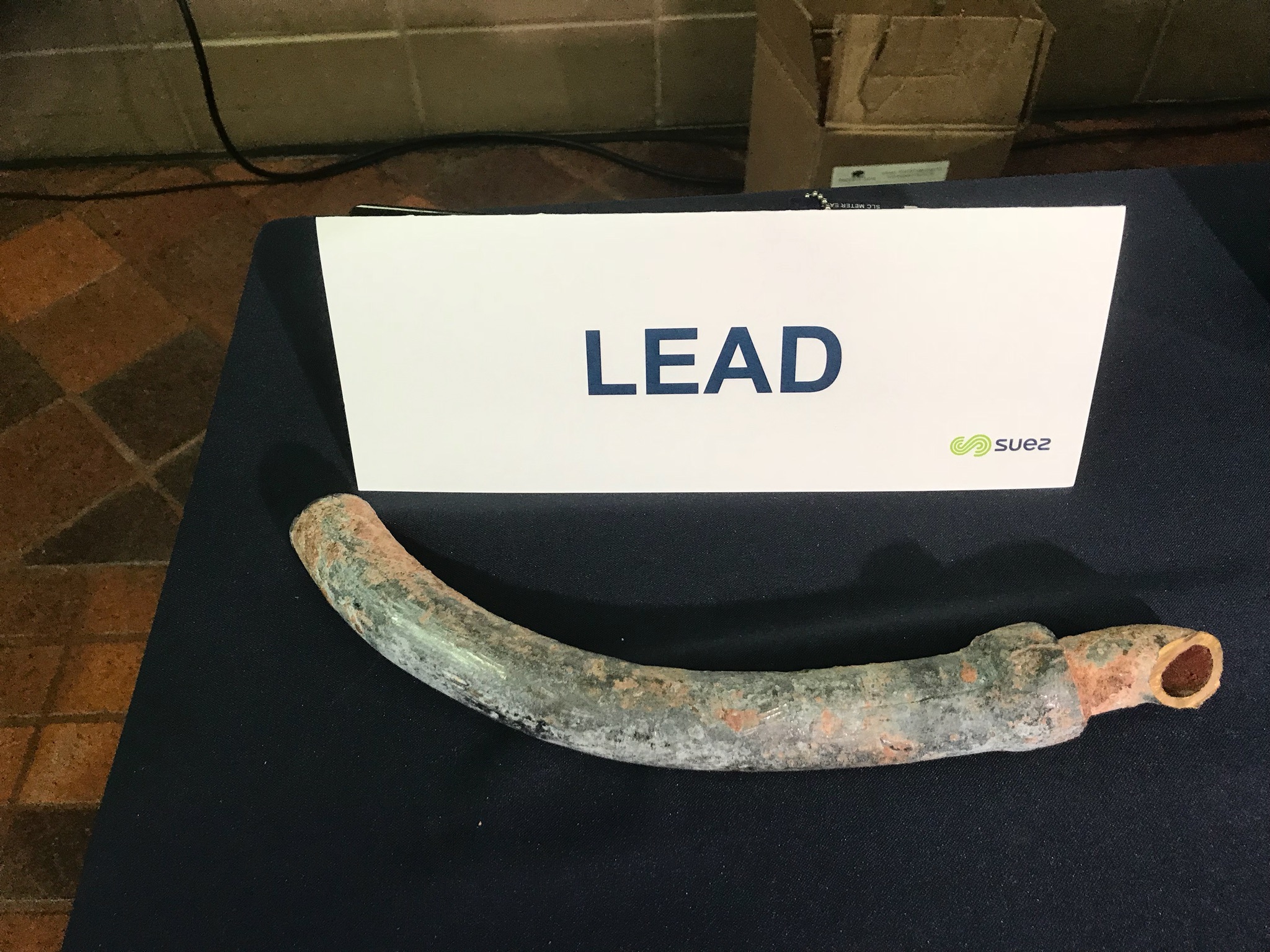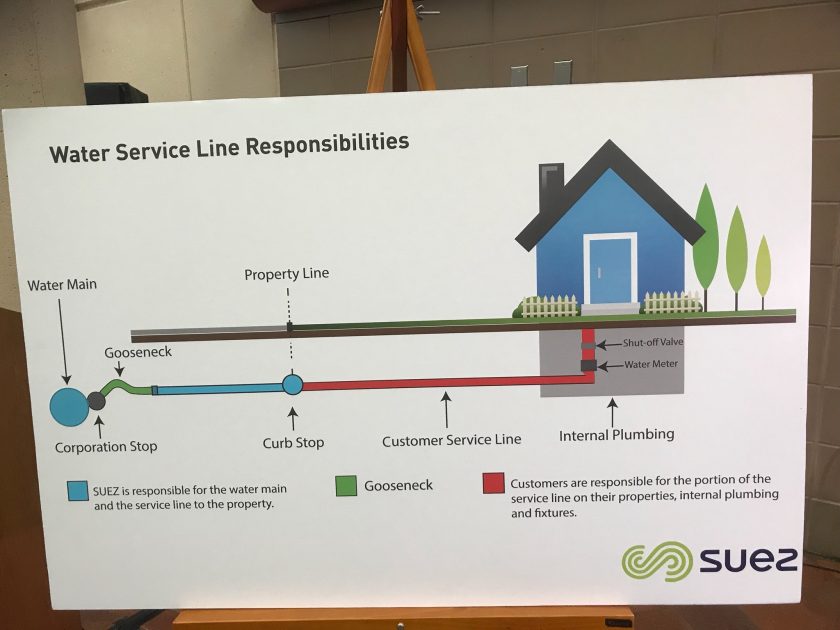
BY MICHAEL OLOHAN
OF NORTHERN VALLEY PRESS
HAWORTH, N.J.—A local water utility’s efforts to address concerns about elevated lead levels in drinking water in a “very limited” number of homes in two counties are under state and federal scrutiny.
Haworth-based Suez of North America, which serves 57 municipalities in Bergen and Hudson counties, needs to notify customers of its lead service lines providing water and to replace its lead lines “as soon as possible.”
That’s according to Fifth District Democratic U.S. Rep. Josh Gottheimer, who told Northern Valley Press that he connected with Suez officials Jan. 22, immediately after Suez disclosed high lead levels in some customers’ drinking water.
Gottheimer wrote the utility, “Like all Americans, New Jersey families must have access to clean drinking water. I am deeply committed to protecting our communities from lead and other dangerous contaminants, which can be harmful to children and seniors especially.”
Suez plans ‘aggressive effort’
Suez spokeswoman Debra Vial said 2019 will be a year focused on eliminating lead service lines.
“It is clear that our customers and elected officials, like us, want strong action. Suez is embarking on an aggressive effort to replace utility-owned lead service lines, work that will cost tens of millions of dollars in 2019 alone. The company will focus its initial phase of replacements in municipalities with the highest number of utility-owned lead service lines. We will also be targeting towns with planned road projects so that we can replace service lines at the same time. This will reduce the disruption to neighborhoods,” she emailed Jan. 31.
“This work takes considerable planning and coordination, including the mobilization of additional construction crews, inspectors and engineers and also the cooperation of municipalities. We encourage officials to quickly approve permits and to coordinate with us on their road infrastructure work so we can move ahead. We look forward to providing more details about our plan soon,” Vial said.

Gottheimer making requests
Gottheimer said he would ask Suez whether a finding of elevated lead in drinking water test results would expedite lead line removals for customers experiencing such levels exceeding federal standards.
“Parents are justifiably alarmed at the results of the test, which indicated levels of lead reaching 18 parts per billion, well above the federal standard of 15 parts per billion. Knowing of the technology available, there is no reason why North Jersey families should be facing this reality in 2019.”
Gottheimer said he would further press Suez on the issue, including releasing a list of what towns experienced high lead levels in recent sampling.
Following Suez’s revelation Jan. 16 that a state-mandated drinking water quality sampling showed 16 of 108 homes in Bergen and Hudson counties had elevated lead levels in drinking water, Gottheimer called on Suez to take five immediate steps “to address the threat of lead in our drinking water and the serious risks it poses for children and families in the local community.”
Despite repeated requests, at the Jan. 16 news conference and follow-up emails, Suez declined to provide details of specific towns where homes showed elevated lead levels, nor would it provide numbers of Suez-owned lead service lines for Pascack and Northern Valley towns.
Gottheimer wants Suez to:
• Provide its customers self assessment information, as many customers are unaware they have lead pipes in their homes;
• Publically disclose the action plan required by NJDEP;
• Review and revise its timetable to fully replace lead pipes;
• Notify residents, as well as account holders, so that renters may have immediate access to information; and
• Ensure that information and test results shared with customers be provided in clear, easy to understand language.
Gottheimer told Northern Valley Press on Jan. 30 that he spoke with Suez North America CEO Eric Gernath as a follow-up to his letter and asked him to produce a “plainspeak document” that simplifies what customers need to do to determine if a lead hazard exists and easy steps to mitigate lead hazards in drinking water.
He said he further is urging the New Jersey Department of Environmental Protection (NJDEP) to expedite agency approvals for Suez communications on the issue.
The Environmental Protection Agency has set the maximum contaminant level goal for lead in drinking water at zero because lead is a toxic metal that can harm people even at low exposure levels.
Lead is persistent, and it can bioaccumulate in the body over time. Although children are at increased risk of the effects of lead poisoning, exposure via drinking contaminated water can also sicken adults, EPA says online.
State sets 10 conditions
In Jan. 7 letter of non-compliance with state drinking water standards—the lead level is 15 parts per billion—NJDEP cited 10 conditions required of Suez, including reviewing its corrosion control treatment program at the Haworth treatment plant before Feb. 7 and submitting to the state an updated corrosion treatment plan by June 30.
Suez also must perform water quality sampling of at least 100 homes every six months, present eight public information and outreach efforts about lead impacts within 60 days; and report the total number of lead service lines in its service area and a replacement schedule within 60 days.
It also must submit a summary of evaluation and corrective measures taken to optimize the existing corrosion treatment within 30 days.
Corrosion treatment role?
Suez repeatedly noted Jan. 16 that all 108 homes tested had lead service lines but “only” 16 showed elevated lead levels.
In addition to lead dissolving or corroding from lead lines into drinking water, a key variable affecting corrosion is the chemicals Suez uses as part of its corrosion control treatment program.
How many lead lines?
It is not yet clear how many customers are affected. Suez is responsible only for the service line that runs from the street water main to the curb line. Home/business owners are responsible for the service line from the curb into their home or property.
Suez is urging its customers call a customer service hotline or go to its website and enter their account number to determine if the Suez-owned service line to their home is composed of lead.
If its service line is lead, Suez will provide a water testing kit, the company said. If “high” lead levels are found in water samples, Suez will provide the customer a Brita water filter pitcher that is certified to remove up to 99 percent of lead.
On Jan. 31, Suez spokeswoman Vial told Northern Valley Press that the outreach is getting results. Since Jan. 16, she said, 9,000 customers visited Suez’s website to check on their service line, and the utility fielded 3,500 phone calls and 480 emails on the subject and set 460 appointments to test drinking water.
“We are offering testing to customers with known utility-owned lead service lines or those with utility-owned lead service lines that we have not identified the material,” Vial said.
Vial could not say whether the utility would prioritize connection or line replacements for customers whose plumbing tested high for lead. She said the utility replaces 7 percent of lead service lines yearly and requests local officials notify them when service lines are exposed due to road work so they can check if lead lines are present.
Suez also provides do-it-yourself information on its website to help customers determine if their water service line—which runs from the curb line to their home—might contain lead.
